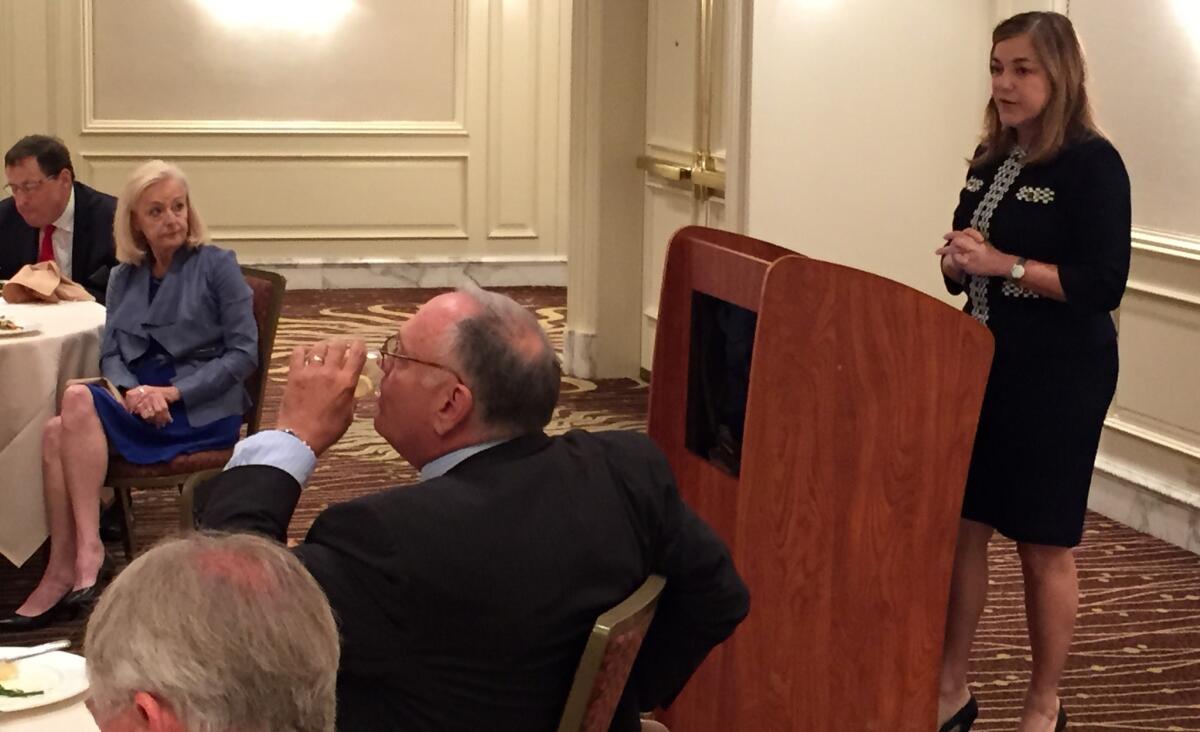Loretta Sanchez tests Senate race attack on Kamala Harris

Rep. Loretta Sanchez (D-Garden Grove) addresses the Democratic Foundation of Orange County in Irvine on Monday.
Rep. Loretta Sanchez tested themes Monday for a U.S. Senate run, playing up her record on national security and civil liberties while casting Democrat Kamala Harris as ill suited to succeed incumbent Barbara Boxer in next year’s election.
Sanchez, an Orange County Democrat, portrayed herself as the rare member of Congress who stands up to political pressure. Speaking at a Democratic Foundation of Orange County lunch in Irvine, she reminded the crowd of her 2002 vote against the U.S. invasion of Iraq.
“People forget how difficult, how hard, and how unpopular that vote really was,” Sanchez said. “I was spit at. I had to have bodyguards when I came back to Orange County.”
Sanchez, who burst into national politics in 1996 when she unseated Republican firebrand Bob Dornan from Congress, said she had not decided whether to run for Senate.
“There’s money people to talk to,” she said in an interview. “There are organizing people to talk to. There’s my husband to talk to – my colleagues.”
Yet as she mingled with supporters after the speech, Sanchez spoke as though she were already in the race.
One man expressed concern about United Farm Workers co-founder Dolores Huerta backing Harris for Senate. “Maybe a double-endorsement – we’ll see,” Sanchez responded.
“Kamala has the political elite of the party,” she said.
For now, Harris, the state attorney general, is the only well-known Democrat in the race. Some of the state’s Latino political leaders have called for a Latino Democrat from Southern California to join the race. Sanchez is one of several who might heed that call.
In the interview, Sanchez questioned Harris’ qualifications, saying her unfamiliarity with foreign affairs, for example, was a big deal “in today’s times.”
“She doesn’t have any experience at the federal level,” Sanchez said. “None.”
Sanchez also accused Harris of dodging issues. She mocked Harris for refusing to say whether she would have attended Israeli Prime Minister Benjamin Netanyahu’s recent controversial speech to Congress until after it occurred, and for declining for weeks to take a stand on California’s high-speed rail plan.
“As a Californian and as a voter, I’d like to know where she stands on things,” Sanchez said. “And I’d like to see somebody who runs with some experience. I don’t think her experience applies here. That’s just me personally. Other Californians can make their choice. Maybe they like her pearls.”
Harris spokesman Brian Brokaw said the attorney general, a former San Francisco district attorney, was a national leader on such issues as human trafficking, cyber-security and international gang crime.
“We respect Congresswoman Sanchez and her decision-making process,” he said.
Accompanying Sanchez to the lunch was a campaign fundraiser who left what the Sanchez called “money envelopes” on the lunch tables. The envelopes requested up to $2,500 in campaign donations, which Sanchez could spend on a House or Senate contest. Sanchez told the audience the donations would enable her to keep serving in “federal office,” without specifying which one.
In her remarks to the crowd, Sanchez took credit for securing millions of dollars in congressional earmarks for California – money for school construction, freeway widening and an Orange County plant that turns treated sewage into drinking water.
A member of the House Armed Services and Homeland Security committees, Sanchez also suggested trimming military spending to free up money for more water, school and road projects.
Citing her repeated votes against the Patriot Act, Sanchez said she stood up to political pressure to protect the public from overly intrusive surveillance.
“I didn’t like it when my mom used to listen in on the phone when I was in high school,” she said, “and I certainly don’t want the government listing to my calls today.”
Twitter: @finneganLAT
More to Read
Sign up for Essential California
The most important California stories and recommendations in your inbox every morning.
You may occasionally receive promotional content from the Los Angeles Times.











